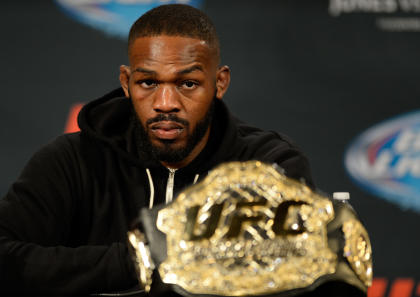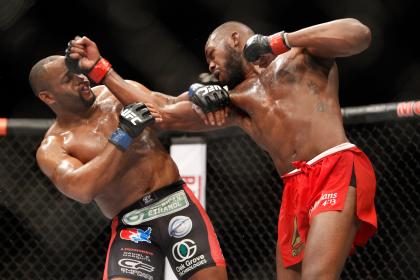Why Jon Jones fell from grace and how he could rise again
LAS VEGAS – The UFC unquestionably made the right decision when it chose to indefinitely suspend Jon Jones, its talented but troubled light heavyweight champion, after he was arrested last month in the aftermath of a hit-and-run auto accident.
Jones is accused of running a red light and crashing into a car driven by a pregnant woman in Albuquerque, N.M. Police discovered a marijuana pipe when they searched the abandoned vehicle following the accident.

Jones left UFC CEO Lorenzo Fertitta and president Dana White no choice but to suspend him and pull him from Saturday’s planned title defense at UFC 187 at the MGM Grand Garden against Anthony Johnson. Daniel Cormier, whom Jones routed at UFC 182 in January in his last bout, stepped in to take his place against Johnson for the now vacant title.
Only a quirk in the rules allowed Jones to meet Cormier in January given that he failed a surprise pre-fight drug test given to him by the Nevada Athletic Commission. He was caught with cocaine in his system in December, but because it was more than 24 hours before the fight it was considered out-of-competition use and thus not banned by the World Anti-Doping Agency rules.
But there were far too many incidents for the UFC to continue to turn its head without taking action. There was the guilty plea to DUI charges in Binghamton, N.Y., in 2012. There was the brawl with Cormier in the lobby of the MGM at a press conference last August. There was the failed drug test in December, as he was preparing to meet his biggest rival.
And there were other incidents, White said, which didn’t become public.
Fertitta and White had to act to protect the brand, which is far bigger than an individual athlete. But they also needed to act to try to help Jones.
Jones is a wondrous talent who, at least in this corner, has already established himself as the greatest fighter in mixed martial arts history. He is every bit as dominant in MMA as LeBron James has been in the NBA or Tom Brady has been in the NFL.
Had he not been stripped, it’s likely he would have reigned atop the division for years.
But there was clearly something troubling him in his personal life that led to all of the trouble he’s found.
MMA is still a new sport and athletes who reach the UFC are, in many cases, hitting the spotlight for the first time in their lives. College wrestling, for instance, doesn’t have the same kind of widespread passionate interest and attention that either college football or college basketball does.
Football and basketball stars are identified early and are used to the spotlight by the time they get into college. But athletes from the sports that feed MMA – wrestling, jiu-jitsu, judo, etc. – aren’t nearly as in demand.
And so when the spotlight and the attention does come, it can be overwhelming.

Former UFC fighter Brian Stann is a one-time teammate of Jones’ at Greg Jackson’s camp in Albuquerque. He is now working as a consultant with the Atlanta Falcons, hired by new Falcons coach Dan Quinn to bring more of a fighter’s mentality to the team.
Stann said there is a lot more peer support for a young NFL player than there is for a comparable MMA fighter.
“There is a great structure on these teams for the young kids who get drafted, and even for the veterans,” Stann said. “The veterans will hold them accountable for the way they act, the way they work, the way they spend their money, so many things. There is a place for them to go to get help and for them to assimilate into the team and the sport. It’s totally different in MMA. There are teams, but it’s nowhere [near] the same as an NFL or an NBA locker room.
“Jon always has had more to lose than anybody at Jackson’s. I remember from the first day he showed up, Greg Jackson said to me, ‘Brian, that’s my next champion.’ He knew. And that kind of talent and visibility brought out a lot of people who wanted to be friends with Jon with their own interests in mind. He didn’t have nearly the support group there that he would have had had he been in the NFL, say.”
This doesn’t have to be the end for Jones, who despite his dizzying array of records and achievements in the UFC is still only 27. The UFC, and the sport as a whole, is lesser without him, because he has the potential to be a crossover athlete.
Right now, he’s the only fighter beside women’s bantamweight champion Ronda Rousey who has that mainstream crossover appeal. And Cormier noted that much like boxing superstar Floyd Mayweather did in the previous decade, Jones has the ability to bring a new generation of fans to the sport with his reach in the urban market.
“We need Jon in this sport because he has – he had – the ability to cross boundaries and not just stay in mixed martial arts,” Cormier said. “We need him in the company because he can sell pay-per-views. The sport needs him because he’s a dominant champion. People love dynasties. That’s why the Patriots are so popular; the Yankees. People love winners.
“Now, do we need him as the person he’s been? No. We need him as a better person. We need him as a role model, as a person who fixes and fights his demons. But at this point, the UFC, you, me, anyone who liked watching Jon as a fan, we need to think of him as a person first, not as a fighter. Jon Jones the human being needs help and needs to figure out his situation and then when he does that, we can worry about how much this sport could use a guy like him.”
Truer words were never spoken. Jones has found himself as one of the more disliked fighters in the sport, even though at his core he comes across as a good guy.
The media doesn’t really know these athletes, given that the interactions are for short periods and in controlled circumstances in most cases. Then, the athletes disappear into their private lives where their true selves are revealed, good or bad.

Stann, who said he hasn’t been close with Jones the last few years, said Jones cares about his image and has the opportunity to write a good ending to his story before it’s all over. It’s up to Jones, Stann said, to figure out a way to right the ship.
“I think there’s an obligation on those who are around him and who truly love him to stand up and support him and help him get through this,” Stann said. “There are a lot of pressures on him and he needs support to make the best decisions on a daily basis as a father, a husband, a fighter and as a man. He rose to prominence so quickly, I think the attention did get to him.
“We’re all human and we can say we don’t care what is written or said about us, but it can be hurtful if it’s not how we want to be portrayed. … Jon cares about his image and about what people think of him. When he first came to [Jackson’s], he wanted to be a good person. People want to hear he’s this nasty, bad, malicious guy, but I’d be lying if I said that’s who he was. … We all screw up, but fortunately for Jon, nobody has been seriously hurt yet in any of this. I have no doubt that he can turn his life around and resume his career and write an outstanding story of perseverance and redemption.”
A happy, pressure-free Jones would likely be even more dominant as a fighter.
His potential to do good, inside and outside the cage, remains immense.
It’s up to him and those closest to him whether he’s ultimately remembered for more than just his meteoric rise to the top and unseemly fall.
